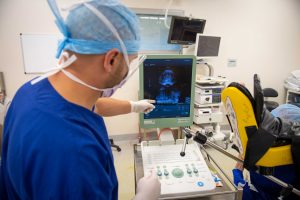MRI-Fusion Trans-Perineal Prostate Biopsy at Melbourne Urology Centre
MRI fusion trans-perineal prostate biopsy (also known as MRI fusion TPB) is a diagnostic technique that is used to accurately sample the prostate for cell changes that may be related to cancer.
An MRI image is coupled with a live ultrasound image to guide the urological surgeon to the areas of concern within the prostate, which are to be sampled.

MRI-fusion trans-perineal biopsy is the only way to definitely diagnose prostate cancer.
At Melbourne Urology Centre, Dr Shekib Shahbaz and Dr Tony de Sousa perform MRI fusion trans-perineal prostate biopsy Melbourne patients can conveniently access at a number of locations throughout Victoria.
Who needs to have an MRI-fusion trans-perineal prostate biopsy?
MRI-fusion trans-perineal prostate biopsy may be indicated for men that:
- Have a nodule or other palpable abnormality on the prostate gland that has been detected during a digital rectal examination
- Have elevated levels of prostate-specific antigen (PSA) on their blood test
- Have been diagnosed with prostate cancer previously, as part of their ongoing monitoring.
Are there particular advantages to having an MRI-fusion trans-perineal prostate biopsy?
Trans-perineal prostate biopsy is the only way to conclusively diagnose prostate cancer. It is therefore a valuable diagnostic tool.
MRI-fusion trans-perineal prostate biopsy allows for:
- The collection of a large number of cell samples to be collected efficiently and accurately from areas of interest
- Sampling of the entire prostate gland
- Visualisation of cell changes:
- Diagnosis of prostate cancer
- In cases where prostate cancer has been diagnosed, allows to monitor for any changes
- Diagnosis of other conditions of the prostate such as:
- Enlargement of the prostate (BPH)
- Inflammation of the prostate (prostatitis), usually caused by infection
- Changes in prostate gland cell type, that is not cancer (PIN).
With MRI-fusion trans-perineal prostate biopsy, there is no rectal bleeding. Outdated biopsy technique used to involve sampling prostate tissue by performing a biopsy rectally, which often caused infection/sepsis.
There is significantly less risk of infection when an MRI-fusion trans-perineal prostate biopsy is performed, when compared with trans-rectal techniques.
How is an MRI-fusion trans-perineal prostate biopsy performed?
Before an MRI-fusion trans-perineal prostate biopsy can take place, the patient will have had to previously had two PSA blood tests, as well as an MRI scan of the prostate.
MRI-fusion trans-perineal prostate biopsy is performed under general anaesthesia. The procedure usually takes between 30-60 minutes to complete.
The urological surgeon inserts an ultrasound probe via the rectum. The live ultrasound image is fused with the MRI image. A special biopsy grid is then positioned against the skin of the perineum (just behind the scrotum). The surgeon is then able to collect biopsy samples from very specific areas of interest within the prostate.
What should patients expect after having an MRI-fusion trans-perineal prostate biopsy?
Most patients are able to go home on the same day following their MRI-fusion trans-perineal prostate biopsy. Some light bleeding in the perineal area is common, and easily managed with gentle pressure. Firm-fitting underwear (not boxer shorts) can assist with applying this gentle pressure.
Some men experience slight discomfort in the area for a day or two following their procedure. Over the counter pain relief can be taken if required.
Some men may notice a small amount of blood in their urine or ejaculate in the days following their procedure, but this usually resolves within a week.
All patients who have an MRI-fusion trans-perineal prostate biopsy performed at Melbourne Urology Centre receive comprehensive post-operative information following their procedure. These instructions can also be accessed online, on our website. Your urologist will provide you with any additional instructions that may be relevant for your individual circumstances.
Outcomes of MRI-fusion trans-perineal prostate biopsy
Recovery time following an MRI-fusion trans-perineal prostate biopsy is generally fast, and most men resume normal activities within a couple of days.
The samples collected during the procedure are sent off for examination by a specialist pathologist, and the results are usually available for review by your urologist within a few days.
MRI-fusion trans-perineal prostate biopsy is useful in the accurate diagnosis of prostate cancer4. It also allows for the differentiation between cancer and other conditions that affect the prostate. If required, your urologist will advise you of the appropriate treatment options, which can then be initiated.
MRI-fusion trans-perineal prostate biopsy in Melbourne
For patients requiring an MRI fusion transperineal prostate biopsy, Melbourne Urology Centre offers patients the highest standard of urological care, with a personalised approach. We offer consultation times and surgical appointments at a number of private hospitals throughout metropolitan Melbourne, as well as in regional Victoria.
Please contact our rooms today on 1300 702 811, or complete our online contact form for further information.
Written by Dr. Shekib Shahbaz and Dr. Tony de Sousa
